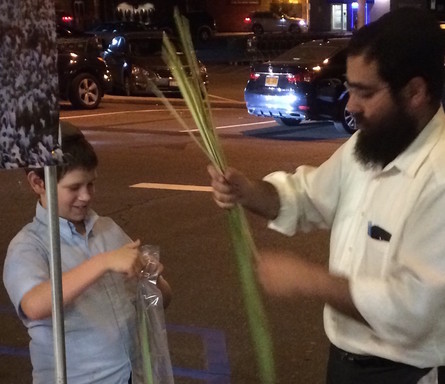Rabbi David Etengoff
336 results total, viewing 311 - 320
|
Our parasha contains two pasukim that reiterate the prohibition of avodah zarah (idol worship) and its practices, the commandment to completely destroy all monuments associated with idol worship …
more
By Rabbi David Etengoff
|
2/3/16
|
|
The final verses of our parasha focus upon the mitzvah of building a stone altar for the purpose of bringing korbanot (offerings) in the service of Hashem: “And when you make for Me an …
more
By Rabbi David Etengoff
|
1/27/16
|
|
The end of parasha Beshalach focuses on the epic battle between our nascent nation and the marauding desert tribe of Amalek:
“Amalek came and fought with Israel in Rephidim. So Moses said to …
more
By Rabbi David Etengoff
|
1/20/16
|
|
The laws pertaining to the construction of the succah are many and varied. Our Sages created an entire Talmudic tractate that analyzed every conceivable aspect of the succah’s constitutive …
more
By Rabbi David Etengoff
|
9/24/15
|
|
The concept of the Jewish people being Hashem’s am segulah is first introduced in Sefer Shemot 19:5: “And now, if you obey Me and keep My covenant, you shall be to Me a treasure out of …
more
By Rabbi David Etengoff
|
9/3/15
|
|
Our holy Torah is composed of both halachic (legal) and narrative portions. While there is usually nearly universal consensus that a particular law exists, halachic passages are often the focus of diverse interpretations regarding their pragmatic application. Thus, an entire genre of Jewish literature has arisen whose sole purpose is to determine the practical ramifications of both Torah and Rabbinic laws. In many ways, the creation of this unique and dynamic body of literature has continued unabated since, at the moment of the Sinaitic Revelation, our forebears declared “Naaseh v’nishmah” (“We will do and we will accept,” Sefer Shemot 24:7).
more
By Rabbi David Etengoff
|
5/23/13
|
|
One of the best-known passages in the entire Torah is that of Birkat Kohanim (the Blessing of the Kohanim):
The L-rd spoke to Moses saying: Speak to Aaron and his sons, saying: This is how you shall bless the children of Israel, saying to them:“May the L-rd bless you and watch over you. May the L-rd cause His countenance to shine to you and favor you. May the L-rd raise His countenance toward you and grant you peace.”
more
By Rabbi David Etengoff
|
5/13/13
|
|
One of the thornier, daily halachic problems is that of which bracha (blessing) to recite on a particular food. Not too surprisingly, a vast literature has been created by our poskim (halachic decisors) that contains a plethora of opinions and approaches regarding every questionable item.
more
By Rabbi David Etengoff
|
5/2/13
|
|
Our underlined phrase, “you shall judge your fellow with righteousness,” is found in the second of the two parshiot we read this Shabbat. As noted in Talmud Bavli, Shevuot 30a, one of the interpretations of this expression is the obligation to judge our fellow Jews in a favorable fashion: “Our Rabbis taught: ‘You shall judge your fellow with righteousness’ - judge your neighbor to the side of merit (Hevay dan et chaverchah l’kaf zechut).”
more
By Rabbi David Etengoff
|
4/18/13
|
|
The untimely and completely supernatural death of Nadav and Avihu serves as one of the focal points of this week’s parasha. Nadav and Avihu were the sons of Aharon and Elisheva: “Aaron took to himself for a wife, Elisheba, the daughter of Amminadab, the sister of Nahshon, and she bore him Nadab and Abihu, Eleazar and Ithamar.”
more
By Rabbi David Etengoff
|
4/4/13
|

 61.0°,
Mostly Cloudy
61.0°,
Mostly Cloudy 
